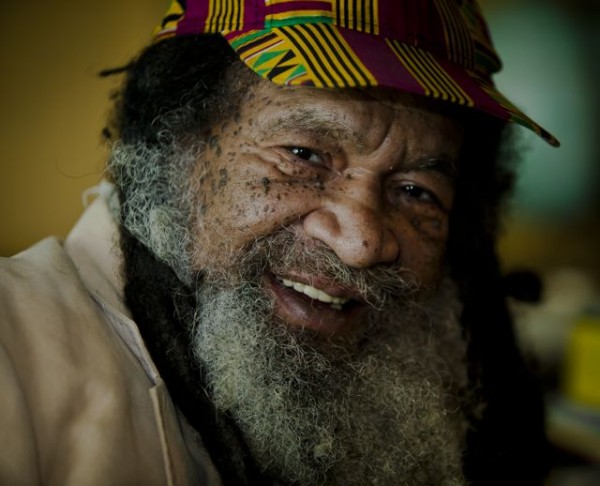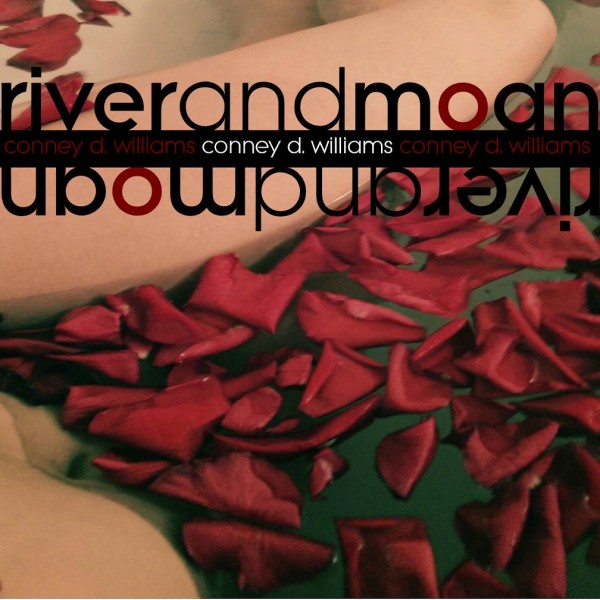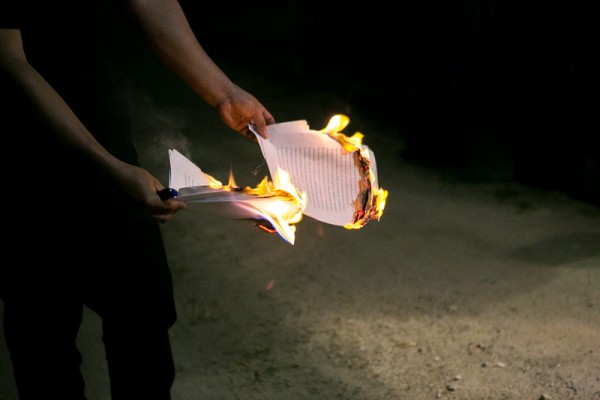I know I am not alone when I say that for me, every month is National Poetry Month. As great as April is with its annual celebration of National Poetry Month, this festival of poetry lasts all year for me and many of my peers. May 2015 has been a very eventful period with poetic events and new releases of poetic recordings. This dispatch will share a few of these.
The pioneering Black Arts poet Sonia Sanchez did an extended set of poems at Cal State L.A. on May 14th. Sanchez was the poet selected for the 30th edition of the annual Jean Burden Reading. For the last 30 years during the Spring, Cal State L.A. hosts the Burden reading with a prominent national poet. In years past greats like Wanda Coleman and Li-Young Lee among many others were chosen. Sanchez kept the standing room only audience enraptured. In between poems, she philosophized and told a lot of great stories from her long life of poetry. Sesshu Foster wrote these three postcards.
Ojenke
On Wednesday May 20th, Southwest College will be featuring Ojenke. Ojenke is a mythical Los Angeles poet that rarely appears in public these days. Known as one of the original members of the Watts Writers Workshop, Ojenke is also known as the mentor of poetic greats like Quincy Troupe and Kamau Daaood. 2015 is the 50th anniversary of the Watts Rebellion and the subsequent founding of the Watts Writers Workshop a few months later that year. Southwest College selected Ojenke to be the featured reader for the annual “Say the Word,” event. “Say the Word,” is the literary journal created by students from Southwest and award winning student poets will be honored prior to Ojenke’s reading. Ojenke will be reading from 11AM to noon in the SSB Building adjacent to the elevator.
I first learned about Ojenke from the book The Dark Tree, by Steven Isoardi. The Dark Tree tells the story of jazz and community arts in Los Angeles, specifically the late 1960s and 70s. Central in this narrative is the great pianist Horace Tapscott and his Pan Afrikan People’s Arkestra. Ojenke would often perform his work accompanied by Tapscott and the Arkestra. The book talks a lot about the Watts Writers Workshop as well and the interaction between the poets and jazz musicians in Black Los Angeles during this era.
In The Dark Tree, Amde Hamilton, aka Father Amde of the Watts Prophets, describes the two schools of poets that came from the Watts Writers Workshop: “The Watts Prophets were one school, and you could say that our school went into the hip-hop thing. Ojenke and his thing went into the Kamaus and the Quincy Troupes. But Ojenke is the papa of those styles there, that preacher kind of thing.”
In 1976, at the National Black Poetry Conference held at Sacramento State University, Ojenke was described as the “John Coltrane of Black Poetry.” Ojenke believes that poetry is primarily an oral art form; to him the spoken word is the only legitimate means to transmit poetry. According to Ojenke, “Poems are written on the hearts of the people.”
Ojenke was invited to read at Southwest College by Nikia Billingslea. Billingslea is an English Professor at Southwest and longtime Angeleno poet. During the early 1990s, when Spoken Word Poetry was becoming popular across the country, Billingslea was very active across Los Angeles and Leimert Park. Her poetic skills led to her being recruited into the Pan Afrikan People’s Arkestra as a poet and singer. In the mid-1990s, she got her MFA at Brooklyn College, where she studied and worked closely with Allen Ginsberg. Billingslea has been teaching at Southwest since 1998 after she finished her MFA. She recently shared with me some of her experiences in the Pan Afrikan People’s Arkestra and how she has been influenced by greats like Horace Tapscott and Ojenke.
Billingslea was drafted into the Arkestra by the heralded singer Dwight Trible. She was at a party hosted by the great poet D’Knowledge where she met Trible. After having an engaging discussion about the local art scene, she was invited to lend her talents in the Arkestra. She says, “Meeting Horace Tapscott and singing in the Voices of UGMAA was like finding my artistic home. I felt safe and protected in that jazz circle. When we rolled, we rolled deep. It would be 20 to 75 of us at a gig. When someone had a show, we would support and represent. It was a family of beautiful, crazy geniuses.”
These early experiences nurtured her performing and writing skills. They also influenced her teaching philosophy. She does her best to encourage young writers at Southwest and around Los Angeles in the same way that Horace encouraged her. “The music felt like a living organism that we nurtured faithfully on Mondays, 6:00pm to 9:00pm. With Dwight and Horace, I learned to be in the moment and let the music happen,” she says. “People use the term cool very loosely, but these cats were the definition of cool: friendly, laid back, ready to laugh, and impressively creative. In a city filled with so many narcissistic, ambitious and egocentric individuals, I feel blessed to have been embraced by such passionate and humble artists. As I get older, I make sure I hold that space of love, acceptance and security for young artists who I encounter.”
Billingslea is thrilled to feature Ojenke at Southwest and share some of the spirit that was given to her when she first started as a writer and musician. Considering that Ojenke is an advocate of poetic alchemy and a longtime resident of South Los Angeles, his appearance at Southwest College on Imperial Highway is appropriate in so many ways. He embodies the idea of the community artist. Following Ojenke’s reading will be an open mic co-hosted by Southwest alumni Jamal Carter. Nikia Billinsglea will be sharing her work along with Southwest students and professors like Darren Cifarelli and Christian Lozada.
Conney D. Williams
The spirit of community arts and mentoring youth is a major part of the zeitgeist in poets from the Leimert Park area. For the last three plus decades, poets like Kamau Daaood, Peter J. Harris, S. Pearl Sharpe and Pam Ward, have worked hard in the community using poetry as a force for social justice and political action. Conney D. Williams, the artistic director from the World Stage, is another poet cut from this same cloth. Williams has just released two spoken word recordings of his work accompanied by music.
The albums are titled Unsettled Water and River and Moan. Together the two records include close to two dozen poems set to music by producer Daniel Weidlein. Weidlein graduated from the University of Southern California’s Thornton School of Music and has worked professionally as a saxophonist, composer, producer, singer, and educator. Weidlein’s own group is called The Vintage Modernists. The name fits because his work with Williams demonstrates vintage modernism as well.
The sonic landscape is an eclectic backdrop that does not overshadow the poems, but actually accentuates the subtlety and precision of Williams’ words. The poet and producer here have an excellent chemistry and this is obvious for both albums. Unsettled Water tackles heartbreak, parenthood, racial politics and rite of passage in thoughtful tracks. The opening piece, “Emmett Till visits Money, Mississippi,” reflects on the South, the Civil Rights era and if things have ever really changed. The music throughout the record moves from bouncy jazz, light electronica and the smoothness of neo-soul. In “House Party,” Williams reminisces about his musical youth and “groove gladiators” in a spirit that fans of Cooley High and What’s Happening!! could appreciate. Williams’ vocals are strong and melt well with the music.
River and Moan reincarnates Pablo Neruda for the 21st Century. Pieces like “Do You Want to Kiss Me,” harken back to Neruda taking long walks with his wife on the beach. Rather than Neruda though, it’s Williams realigning his lover’s emotional equilibrium. He reflects that, “She Only Loves Me on Wednesday.” In pieces like “Devastated Girlfriend #2170,” Williams wonders why love doesn’t live here anymore. Williams examines his pillowcase and decides not to change his sheets because they are a signpost to how it used to be. He wonders how she can still sleep while they both try to move on. Anyone that has ever endured a difficult breakup will be able to identify with the episode he describes.
The piece, “Walls,” has a funky soundscape that commingles nature’s first fruit with boundaries that have no ceiling. Williams climbs Everest to come back down again and bring the walls down one more time. His metaphors move from the walls of Jericho to the Great Wall of China with an “incandescent momentum of lightning.” He has found where Eden exists. In between the sensual imagery, there are a few lines that are both humorous and deeply poignant. The production quality is first rate and the emotional depth extends consistently through both records. There are elements of melancholy and contemplation, but the poems contain enough optimism and laughter throughout that the message ultimately delivers the listener back home more enlightened. Conney D. Williams has recorded two excellent albums that offer a candid window into his soul.
Purchase Albums Here
Ghostmaker
There’s even more to tell. Founder of Writ Large Press, Chiwan Choi, will be offering another edition of his Ghostmaker series at Elysian Park on May 30th. The Ghostmaker project is a series where Chiwan writes a chapter of his book Ghostmaker every other month, which he presents in various sites across Los Angeles County. After Chiwan reads publically, each chapter must be destroyed and no textual or auditory documentation retained. In place of the original writings, Katz’s Deli is contracted to gather and construct a text composed of witness testimony from each event, resulting in a new communal manuscript called Ghostmakers.
By connecting the production, destruction, and reproduction of a book to months of the year and areas of Los Angeles, Chiwan Choi and Katz’s Deli ask, what would it be to spatialize a manuscript, both geographically and socially? Chiwan Choi demonstrates the immediacy of the moment. If a poem echoes through the forest, does anybody hear it? The Ghostmaker series aims to find out.
Ghostmaker #3 Event Page
As this column demonstrates, every month is National Poetry Month. Get out into the city and see for yourself. Salute to Sonia Sanchez, Ojenke, Conney D. Williams and Chiwan Choi for keeping the city inspired.




